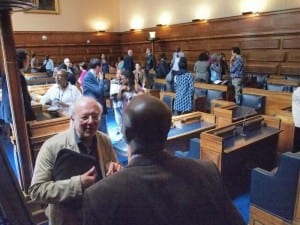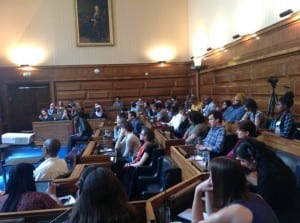Race: confronting myths and deconstructing colonial concepts
By ucyow3c, on 16 June 2014
By Foluso Williams
The August 2011 London riots “were not about race: the perpetrators and the victims were white, black and Asian”. It would seem from Mr Cameron’s comment that Britain is made up of three distinct ‘races’: ‘white’, ‘black’ and ‘Asian’.
However, many would argue that two of the ‘races’ that he has identified represent colours and the other denotes the population of a particular continent. Is Mr Cameron right? Surely, he has painted the best picture of 21st century Britain?

Not according to some academics, who believe that he is just as perplexed with the notion of ‘race’ as the rest of Britain.
This year at UCL, a remarkable array of scholars from various academic disciplines across the globe convened to discuss and challenge many of the misconceptions and complexities associated with the notion of ‘race’.
All speakers, which included staff and students, deconstructed the outdated myths that have lingered throughout different historical contexts and illustrated just how these constructions have become widely accepted in our society.
Two events, the Joint Faculty Institute of Graduate Studies (Figs) Friday Forum on ‘Race’ and Critical Philosophy of Race: Here and Now, revealed through revolutionary research how we can begin to understand and challenge the notion of ‘race’, which is essentially a “colonial construct” that has been imposed on us by misinformed thinkers.
Dr Nathaniel Adam Tobias Coleman, set the scene with his opening speeches and paved the way for a group of dynamic scholars.
The first part of the Figs Forum focused on the construction of racial boundaries in different contexts. Members of UCL from the departments of Languages, Film, Humanities, Science and Anthropology unveiled innovative and unique research that helped overcome the complexities with defining the term and useful strategies to help move the debate forward.

One student showed how illnesses such as sickle cell anaemia, became part of a political agenda to categorise and marginalise groups of people. She showed that although found in various parts of the world, including the Mediterranean and in India, sickle cell anaemia became constructed as a ‘black disease’ that only affects people of African and Caribbean ancestry.
This was not only a racist political agenda, perpetuated by the media, but an extremely powerful tool used to further denigrate a minute proportion of Britain’s population.
In part two of the forum, scholars contested racial boundaries and UCL’s first-ever BME Students’ Officer, Shanell Johnson, spoke of the need to engage with BME students. She said that it is critical that BME students feel that they ‘belong’ at UCL and if they don’t, it will take “300 years before the university achieves its equality targets”.
Such a shocking prospect is bound to provoke action, and not only action that addresses the needs of students. In other parts of London with large proportions of BME communities, many do not trust their elective representatives.
According to one scholar from the university’s Urban Laboratory, this is because BME communities do not benefit from restructuring and images of progress and development are often associated with white people. In other words regeneration exacerbates inequality.
Evidently, there is still a significant amount of work to be done to tackle issues of under-representation and marginalisation among racialised minorities in Britain. The event closed with a commemoration to Stuart Hall who called for racial politics to be undone in Britain and suggested that we embrace a new system with fewer racial categorisations.
Watch a selection of lectures from the Joint Faculty Institute of Graduate Studies (Figs) Friday Forum on ‘Race’ below:
- To view the individual lectures, click on the list icon next to PLAYLIST in the top left corner of the player
Critical Philosophy of Race: Here and Now
Scholars reconvened in June but this time for ‘Britain’s third conference on the critical philosophy of race’ at Senate House. Critical philosophers of ‘race’ have often focused on America by responding to the political problems in America and British philosophers are frequently overlooked. This discussion was about Britain, and British philosophy only.

The event got off to a flying start with leading academics from a diverse range of disciplines interrogating how our society has been constructed. Professor Onora O’Neil, current Chair of the Equality and Human Rights Commission, described key aspects of the equality referendum including the special duties of public authorities that prohibits discrimination based on nine protected characteristics, including “race”.
Professor O’Neil highlighted just how convoluted the definition of race has become. In the statute ‘race’ is defined as nationality, origin, caste, ethnicity or “descent-based characteristics”, further adding ambiguity to the term.
Echoing these points Dr Meena Dhanda, of the University of Wolverhampton, talked about various analyses of caste in India and drew parallels with the construction of race in the UK and the confusion with contextualising ‘caste’ and ‘casticism’.
What emerged from the discussion was the difficulty that we have with defining race on the one hand but on the other, how we freely go about classifying people racially. Moreover, even in the 21st century, attempts to define ‘race’ have been ineffective and the term has been modified unsuccessfully decade after decade.
Professor Robert Bernasconi of Penn State University, stated that ‘race’ has now become a political term that is about culture, and everything to do with race in Britain is about protecting British culture. Speaking about racism in Britain, Professor Bernasconi said that racism keeps reinventing itself and the British media is now legitimising racism through the use of language. The racist agenda of politicians in Britain today has shifted to tackling problems of immigration, or put bluntly, dealing with increasing numbers of people that are not white.
Political parties seem to hide behind one another to promote their own racist agendas, although they are all essentially proposing the same policies. He said that we must “expose the racism of politicians who denounce the racism of others to make their own seem more respectable or invisible”. Professor Bernasconi argued for “institutional changes” while Dr Annabelle Lever (Associate Professor of Normative Political Theory, Geneva), added that democracy is about governing and not just electing people and, therefore, “the administration of justice and the execution of justice” is absolutely key.
As the debate drew to a close, scholars stressed that the “fight was not over” and that the “philosophical canon” ought to be dismantled and rebuilt by a new community of thinkers.
Dr Gabriella Beckles-Raymond from Canterbury Christ Church University challenged the notion of “multiculturalism” and the myths of racial harmony portrayed through false images of “mixed race masquerades” in British media.
Echoing her points, Dr Nicholas Kwesi Tsri, a Postdoctoral Fellow in the School of Social Justice at University College Dublin, said that we should think critically about “colonial language” and challenge the notions that we have adopted.
Altogether, the discussions were extremely thought provoking and inspiring. The Friday Figs Forum and the ‘Critical Philosophy of Race: Here and Now’ revealed unique and ground breaking research, but crucially, they highlighted the need for change.
Dr Omar Khan of Runnymede Trust called for changes in public policy through active engagement with philosophical thinkers. Dr Brian King of the University of Oxford said that the critical philosophy of race should also be self-critical and that we should challenge the “lexicon of bigotry” that is becoming increasingly embedded in British society.
Perhaps we should adopt David Cameron’s simplified definitions for ease of reference, or indeed construct terms that decry colonial constructs. Whatever the case may be, it is apparent that the philosophical canon is about to be re-shaped and re-ignited by a new wave of extraordinary philosophical thinkers, innovators and pioneers.
Watch all the lectures from Critical Philosophy of Race: Here and Now below:
- To view the individual lectures, click on the list icon next to PLAYLIST in the top left corner of the player
LINKS
Joint Faculty Institute of Graduate Studies: Friday Forum on ‘Race’
Critical Philosophy of Race: Here and Now
Critical Philosophy of Race: Beyond the USA blog
Critical Philosophy of Race – call for papers
#uclrace
#critphilrace
One Response to “Race: confronting myths and deconstructing colonial concepts”
- 1
 Close
Close


This sounds like an event I would really have enjoyed. Thanks for the summary. I hope many conversations about race and racism wether ideological, philosophical, political will keep going. It is a shame there was no psychological/psychoanalytical perspective. Of course this being my field I am probably a little bit biased…Thank you.